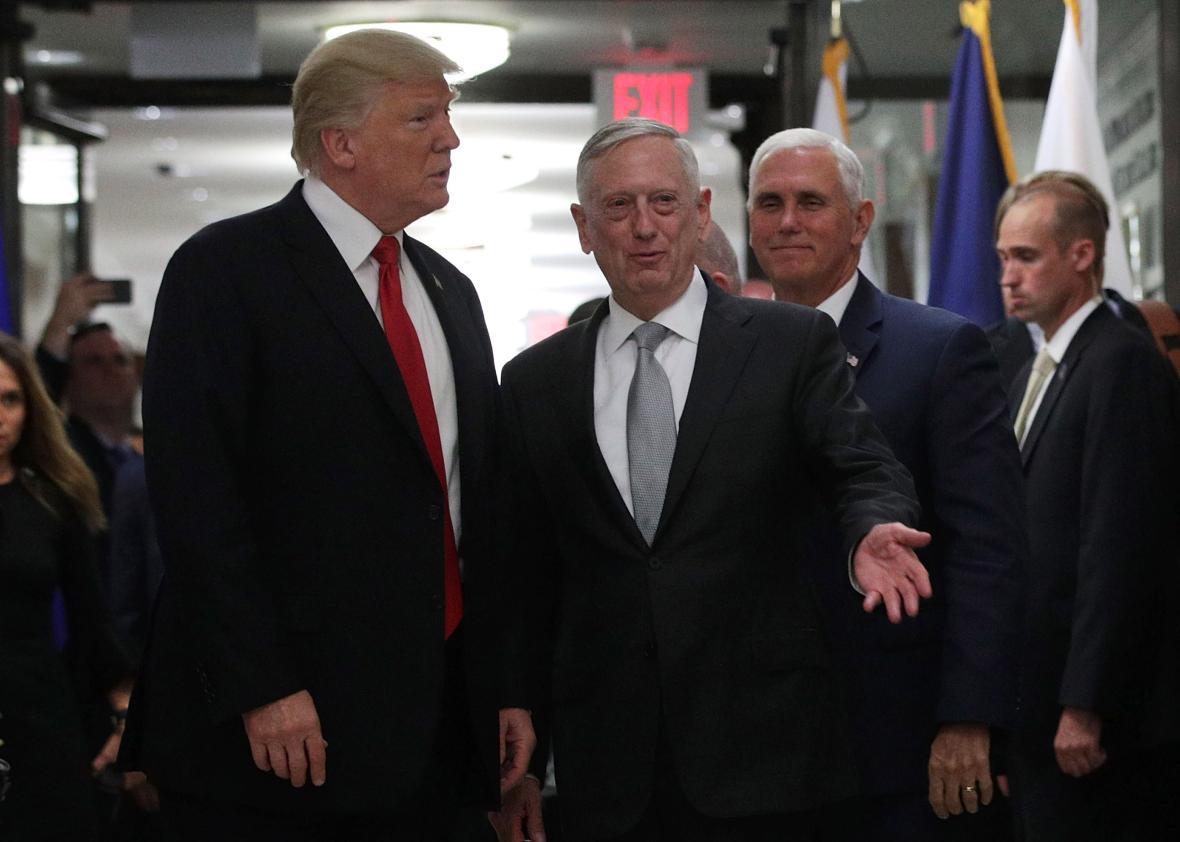On Tuesday evening, USA Today published a surprising report alleging that Secretary of Defense James Mattis had frozen President Donald Trump’s ban on transgender troops. Mattis, the report explained, had convened a panel of experts to study transgender service and make recommendations next year. His “move,” the article concluded, “buys time for the Pentagon” to determine the fate of trans troops who are currently serving.
This framing is an extreme mischaracterization of the facts. Mattis did not “freeze” the trans ban, and he is not “buy[ing] time” in some potentially insubordinate effort to buck Trump. In reality, the secretary is doing exactly what Trump directed him to do in a recent memo.
Trump notoriously tweeted his ban on trans troops in July, but the Pentagon—which had reportedly not been consulted—declined to enact the new policy without further information. So on Friday, Trump issued that information in a memo directing the implementation of his ban. The memo ordered the secretary of defense, in consultation with the secretary of homeland security, to “determine how to address transgender individuals currently serving in the United States military.” Their study must focus on “military effectiveness and lethality, budgetary constraints, and applicable law.” By Feb. 21, 2018, the secretaries must submit a plan explaining how best to implement the ban. And on March 23, 2018, the full ban will take effect. Until then, “no action may be taken” against openly trans troops who are now serving.
In his Tuesday announcement, Mattis declared that he will do precisely what the memo requires of him. He is not suspending the ban or disobeying Trump, but simply following orders. Moreover, as Nathaniel Frank explained in Slate, the memo does not give Mattis real discretion in executing the ban. He can, theoretically, provide a recommendation that Trump scrap it. But barring a reversal by the president, Mattis lacks any real ability to protect trans troops.
The strategy laid out in Friday’s memo is designed to lend legitimacy to an arbitrary and capricious policy that is motivated solely by politics. In fact, the Pentagon already commissioned a study which concluded that open transgender service will have no negative effects on the military while costing very little. Mattis’ new “study,” by contrast, will almost certainly provide some pseudofactual cover for the trans ban.
Shannon Minter, legal director for the National Center of Lesbian Rights—which filed a lawsuit to block the policy—told me that USA Today’s “inaccurate reporting” is “playing into a patently bogus strategy to make it appear that there is going to be some new ‘study’ that will legitimize what is already a forgone conclusion: the discriminatory banning of military service by transgender people, based on a characteristic that has no bearing on their fitness to serve.” The Friday memo, Minter noted, “is perfectly clear: Trump has ordered the military to ban transgender people from serving. That ban will go into effect on March 23.”
Trump’s decision, Minter continued, “is not based on any hastily assembled, post hoc ‘study’ that is being cooked up now in a transparent effort to provide a retroactive fig leaf for the president’s bigotry. The military spent two years carefully reviewing all of the relevant evidence on this issue and concluded that there is no reason to exclude transgender people from military service. The cost of inclusion is literally negligible, and there is no evidence that permitting open service will have any negative impact on military readiness. The notion that there is any good faith ‘study’ being conducted is a blatant pretext for discrimination.”
Chase Strangio, an ACLU attorney who co-authored that group’s lawsuit against the ban, agrees. “Though Defense Secretary Mattis appears rightly troubled by the president’s action, his statements do not change the directive nor has he been given the power to retain transgender service members indefinitely.”
These reports of a “freeze” on the ban—which many outlets, including Slate, have picked up and framed as USA Today did—serve the administration’s narrative in two ways: They legitimize a “study” that is designed to reach a foregone conclusion, and they falsely portray the ban as more lenient or unsettled than it really is. Absent court intervention, the trans ban will take effect next year. And unless Trump changes his mind, there is virtually nothing Mattis can do to stop it.
